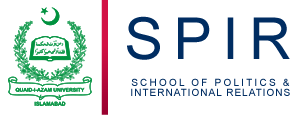The School of Politics and International Relations, Quaid-i-Azam University, in collaboration with Islamabad Institute of Conflict Resolution (IICR), organized a seminar on “Challenges to Pakistan’s Foreign Policy” on May 9, 2017. The dignified panel consisting Maj. Gen. (R) Raza Muhammad, (Executive Member of IICR), Prof. Dr. Anwar Sarwar Khan (Chairman IR Department, NUML) and Amb. Riaz Khokhar (Former Foreign Secretary) dwelled UPON the topic and shared their insights. Dr. Nazir Hussain (Director SPIR) while welcoming the guests, expressed that multiple challenges are being faced by Pakistan at the moment, in the situation where Pakistan is confronting hostile neighbors at Afghan, Iranian and Indian fronts, simultaneously.
Maj. Gen. (R) Raza Muhammad explained that carving out the foreign policy is a very difficult task and though Pakistan’s foreign policy had been encountering many pressures ever since the partition, overcoming territorial issues, trying to balance relationship with neighbors, pursuing its policies post 9/11, and surviving for almost seven decades, could be regarded as its foreign policy’s success. “Lawfare”, developing, defending and continuing nuclear program and hindrances in CPEC, are but a few of those challenges.
Prof. Dr. Anwar Sarwar Khan, while highlighting the challenges to foreign policy of Pakistan ever since its inception and the dismemberment of Pakistan in 1971, said that since internal situation of the country is a major determinant of its Foreign Policy, so Pakistan would have to improve its political culture, which is very immature at present. Democracy and good governance would work hand in glove with each other and resultantly political stability inside the country would lead to a stable foreign policy of Pakistan.
Amb. Riaz Khokhar stressed that foreign policy of a country, has a symbiotic relationship with the internal policies of a country. Pakistan’s present internal situation could be compared to a time bomb. Politically fractious, economically weak, radicalized, occupied with sectarian violence, absence of knowledge based society, huge debt, urbanization, environmental degradation and lack of unity and cohesion are important challenges affecting foreign policy of Pakistan. Pakistanis must put their act together to prepare for future and must effectively formulate policies concerning Pakistan’s relations with Great Powers, Regional states (especially India, Afghanistan and Iran), Muslim world and it is absolutely imperative to strengthen Pakistan to have independent foreign policy.
Ms. Sabah Aslam (Executive Director of IICR) thanked the faculty members and students for showing utmost interest and attention in the seminar and participating in question/answer session.
